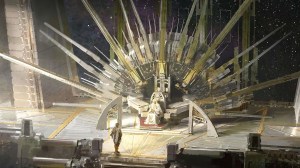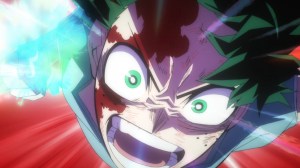HBO’s Watchmen is over halfway done with its first season, and it’s hard to deny that the series has been changing what fans thought they knew about the iconic DC Comics graphic novel. The series, which is set decades after the events of the original story, follows a modern-day conflict between the Tulsa Police and the Seventh Kavalry, a white supremacist group that has followed the symbol of Rorschach.
Videos by ComicBook.com
Fans have definitely learned to expect the unexpected within this series, with even the most innocuous and subtle moments holding surprising information and clues. This is especially true for the series’ episode titles, which have been pulled from everything from classic literature to the works of Devo.
Now that audiences have somewhat of an understanding of all of the elements at play in Watchmen, we thought it was time to break down the meaning of each of Season 1’s episode title. Read on to find out what each title is inspired by, and what meaning they could have within the world of the show.
Episode 1 – “It’s Summer and We’re Running Out of Ice”
It’s safe to say that Rodgers and Hammerstein’s Oklahoma! played an integral role in the pilot episode, right down to Judd Crawford (Don Johnson) and his wife attending a performance of “Black Oklahoma!” in one of the show’s earliest scenes. The title itself, “It’s Summer and We’re Running Out of Ice”, takes this a step further, as it is a line from a song in the musical called “Pore Jud is Daid”.
The full line, which is played during the episode’s final season, proclaims: “Pore Jud is daid, Pore Jud Fry is daid, All gather ’round his cawfin now and cry, He looks like he’s asleep, It’s a shame that he won’t keep, But it’s summer and we’re running out of ice.”
Granted, some have argued that the nature of the episode title may have intentionally spoiled Judd’s eventual death in the episode’s final sequence. Even Patrick Wilson, who both played Nite Owl in the Watchmen movie and starred in a 2002 Broadway revival of Oklahoma!, shared that sentiment.
“I have! When the guy comes on and his name’s Judd, I’m like, ‘Well, he’s not long for this world,” Wilson said in a recent interview. “Unfortunately, when you know the score like I do, you’re like, ‘Okay, poor Judd is about to die.’
Episode 2 – “Martial Feats of Comanche Horsemanship”

The series’ second episode title also (understandably) has a tie to Judd Crawford, albeit in a much more abstract way. “Martial Feats of Comanche Horsemanship” serves as a loose reference to “Comanche Feats of Martial Horsemanship”, an 1834 painting from George Catlin, which hangs in the Crawford family home.
Peteypedia, the show’s companion website of in-universe media, expands on that particular painting in a surprising way. In a piece of evidence titled “Four Letters”, the anti-vigilante congressman named J. David Keene writes a letter to “Sheriff Crawford” (presumably Judd’s father) in 1955. The letter reveals that Catlin had to sell his original paintings and then re-create them, making slight differences in each piece (something that the painter did in real life).
“These recreations – he called them his ‘cartoon collection’ – did need new titles, of course,” Keene writes in the letter. “The painting in your custody is one of those authentic replicas; it is called ‘Martial Feats of Comanche Horsemanship’. A simple juxtaposition of words that allows for the immoral transgression of plagiarism, although the victim of this theft is the artist himself.”
Episode 3 – “She Was Killed by Space Junk”
Episode 3’s episode title – “She Was Killed by Space Junk” – announces the arrival of Laurie Blake (Jean Smart) in multiple ways. The title takes its name from the song “Space Junk”, from the iconic pop-rock band Devo. In the original comics, Laurie mentions her love for Devo, something that carries over into the present-day when she tells her smart speaker to play the band’s songs after returning home from work.
The “Space Junk” of it all takes a whole other meaning by the end of the episode, after Laurie is nearly hit by Angela Abar’s (Regina King) car falling out of the sky. It also arguably fits into the story Laurie tells of being “the girl who threw the brick”, which later rains down from the sky and hits God in the face.
Episode 4 – “If You Don’t Like My Story, Write Your Own”

Episode 4’s title – “If You Don’t Like My Story, Write Your Own” – takes its name from a line from Chinua Achebe’s 1958 novel Things Fall Apart. The novel chronicles the life of Okonkwo, a wrestling champion in a Nigerian clan whose life gets deeply affected by British colonialism.
Things Fall Apart factors into the episode itself, as Cal Abar (Yahya Abdul-Matteen II) can be seen reading it when Angela comes home. Angela then spoils the ending of the novel for Cal, which he jokes is her attempt at starting a fight with him.
But even in the abstract, the episode title fits into Watchmen in quite a few ways — from Angela discovering the surprising nature of her family tree to Adrian Veidt (Ozymandias) carrying out his bizarre escape plan.
Episode 5 – “Little Fear of Lightning”
Episode 5’s title – “Little Fear of Lightning” – is another literary reference, this time to Jules Verne’s Twenty Thousand Leagues Under the Sea. The full quote is “If there were no thunder, men would have little fear of lightning”, which factors into the episode in an interesting way.
The installment centers around Wade Tillman/Looking Glass (Tim Blake Nelson), and the origin story that led to him to become a paranoid superhero. Throughout the course of the episode, Wade learns that Veidt was the one who deliberately orchestrated the giant squid attack, which led to the countries of the world bonding together instead of causing more destruction in the Cold War.
Episode 6 – “This Extraordinary Being”

“This Extraordinary Being”, the title for Episode 6 of the series, seems to draw inspiration from another in-universe piece of material. This time around, it resembles a line in Hollis Mason’s Under the Hood, a memoir about the rise of vigilantes. The passage, in particular, covers a stick-up at a supermarket that was stopped by Hooded Justice, something that we’ve already seen dramatized on American Hero Story: Minutemen.
“Reportage on this second instance was more detailed,” the passage reads. “A supermarket stick-up had been prevented thanks to the intervention of “A tall man, built like a wrestler, who wore a black hood and cape and also wore a noose around his neck” This extraordinary being had crashed in through the window of the supermarket while the robbery was in progress and attacked the man responsible with such intensity and savagery that those not disabled immediately were only too willing to drop their guns and surrender.”
For those who subscribe to the ever-growing theory that Will Reeves (Louis Gossett Jr.) is secretly Hooded Justice, this title is certainly going to raise some eyebrows.
Episode 7 – “An Almost Religious Awe”
The series draws from the original world of Watchmen again with Episode 7’s title “An Almost Religious Awe”. The line is lifted directly from a sequence in Issue #4 of Watchmen, in which Doctor Manhattan chronicles his time stopping the Vietnam War.
As Manhattan explains, “The Vietcong are expected to surrender within the week. Many have given themselves up already… Often, they ask to surrender to me personally, their terror me balanced by an almost religious awe.”
Could this be the episode where Doctor Manhattan finally makes an appearance? Fans will have to wait and see.
Episode 8 – “A God Walks Into a Bar”

Episode 8 seems to have the most abstract episode title yet, with the both simple and complex name of “A God Walks Into a Bar”. The title itself doesn’t have any analog In our popular culture, outside of a few religious self-help books.
The title brings to mind the joke that Laurie told in Episode 3, in which she referred both to a normal god and to Doctor Manhattan being a “Blue God”. The title certainly continues the suspicion that Doctor Manhattan might have a bigger role in the episodes to come, but it remains to be seen if that’s the case.
Episode 9 – “See How They Fly”
The season’s final episode title, “See How They Fly”, might be its most recognizable – and it’s most perplexing – one yet. The title mirrors a line from “I am the Walrus”, a 1967 song from The Beatles.
The song itself contains multiple uses of “See How They Fly” — both of which are constructed around police officers and cops. The first verse proclaims “I am he as you are he as you are me and we are all together, See how they run like pigs from a gun, see how they fly, I’m crying”, while the third verse says “Mister City, policeman sitting, Pretty little policemen in a row, See how they fly like Lucy in the Sky, see how they run, I’m crying, I’m crying”.
Just based on context clues, this certainly seems to hint at more of the conflict between the Tulsa Police and the Seventh Kavalry, and whatever the heck the latter group is currently planning.
There’s also the song’s mention of “the egg man”, which feels fortuitous considering just how many eggs have factored into the season thus far.
***
Watchmen airs Sundays at 9/8c on HBO.








